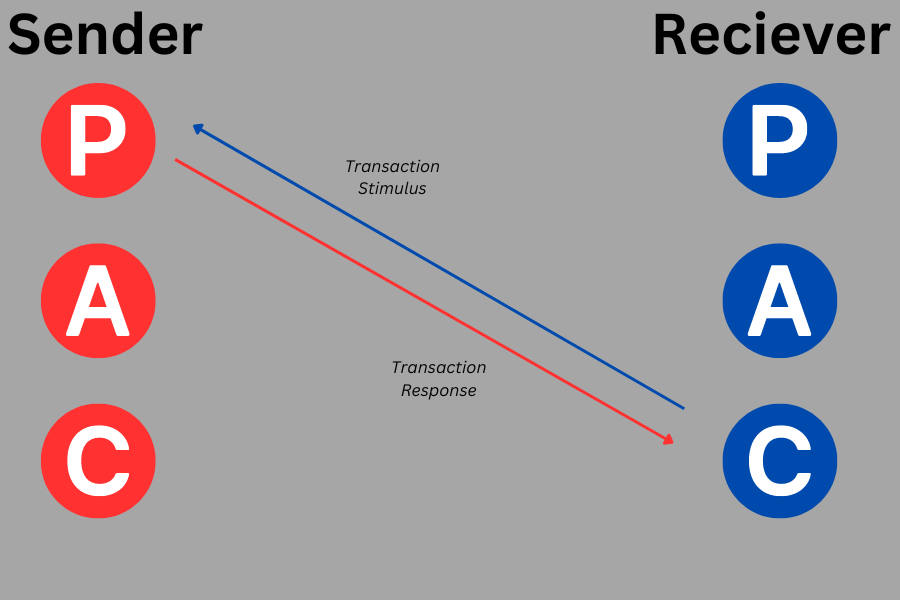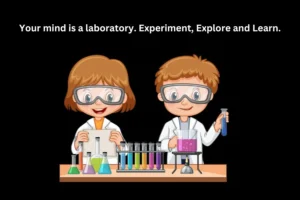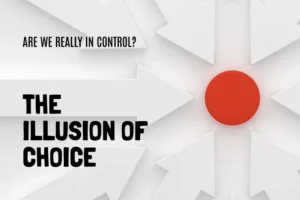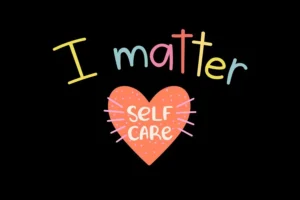Certain figures in psychology stand out for making revolutionary contributions that have reshaped our knowledge of human behavior and relationships. Eric Berne is unquestionably one of those figures whose contributions have left an indelible impression on the sport. Berne’s pioneering theory of transactional analysis transformed communication dynamics and provided remarkable insights into interpersonal interactions.
This article dives into Eric Berne’s life, work, and lasting legacy, examining how his concepts continue to affect psychology and interpersonal dynamics. We’ll look at Berne’s early life and education, as well as his professional career and inspirations, and his most important publications and accomplishments. Following that, we will go into transactional analysis theory, learning about its principles, important concepts, and practical applications.
Berne’s theory revolves around three ego states—Parent, Adult, and Child—that impact our thoughts, feelings, and behaviors throughout interactions. We will examine these ego states in detail, as well as the transactional analysis techniques created by Berne to improve interpersonal interactions and stimulate personal development.
Furthermore, we will look at how Berne’s discoveries have been implemented in relationships, allowing people to improve communication, settle problems, and foster personal growth. Real-life examples and practical solutions will help readers develop a better grasp of how transactional analysis principles can be applied in everyday encounters to promote stronger relationships and emotional well-being.
As we investigate Berne’s impact on psychology, we will see how his theories transformed communication dynamics and influenced current research and practice. Transactional analysis evolves and finds new applications in a variety of domains, including clinical psychology and organizational development.
Finally, we will reflect on Berne’s lasting impact and discuss future directions for further research and applications. Readers will be inspired to explore and incorporate Berne’s revolutionary concepts into their own personal and professional domains after hearing a summary of his accomplishments and a call to action for using transactional analysis principles in everyday life.
Join us on this adventure as we discover Eric Berne’s enormous effect and unique approach to understanding human behavior and communication dynamics.
Table of Contents
Introduction
Overview of Eric Berne’s Impact on Psychology

Eric Berne was a notable physician and psychoanalyst who made substantial contributions to psychology, particularly in the field of transactional analysis (TA). Berne, born in 1910, produced groundbreaking theories and treatment procedures that continue to affect current psychology.
Berne’s most renowned work, “Games People Play,” was released in 1964 and brought transactional analysis to a larger audience. Berne’s landmark book examined human interactions through the prism of transactions, or social exchanges between persons.
One of Berne’s major ideas is the concept of “life scripts,” which are unconscious patterns of behavior and beliefs acquired in childhood. These scripts shape people’s perceptions of themselves, others, and their surroundings, influencing their interpersonal connections and life decisions.
Berne’s transactional analysis theory helped to comprehend communication, personality development, and interpersonal dynamics. By examining transactions and recognizing unhealthy patterns, people can gain insight into their behavior and make positive changes to improve their relationships and general well-being.
Eric Berne’s Transactional Analysis

Eric Berne developed transactional analysis, a theory of personality and communication, in the 1950s. At its foundation, transactional analysis tries to explain human interactions and relationships by examining individual transactions, often known as social exchanges.
Berne hypothesized three ego states that humans can use during interactions:
- Parent: This ego state refers to learned habits, attitudes, and values from parents or authority figures.
- Adult: This ego state exhibits rational thinking, problem-solving skills, and objective appraisal of reality.
- Child: The child’s ego state includes emotions, spontaneity, and fun conduct that reflect childhood experiences and sentiments.
The transactional analysis also identifies the transactional patterns, or “games,” that people play during interactions. These games contain repetitive, predictable sequences of conduct designed to meet psychological demands or win recognition.
Individuals who recognize and understand these ego states and transactional patterns can enhance their communication skills, settle disagreements, and form stronger relationships.
Example: Consider a couple, Mark and Emily, who constantly disagree about home responsibilities. Mark frequently uses a critical tone while asking Emily to complete her share of the cleaning, which elicits Emily’s defensive responses. The transactional analysis allows them to see how Mark’s “parent” ego state shapes his communication style, whilst Emily’s “child” ego state responds defensively. They can address underlying difficulties and develop mutually beneficial solutions by entering the “adult” ego state and communicating openly and respectfully.
Eric Berne and Interpersonal Communication
Eric Berne’s work on transactional analysis has profoundly influenced our understanding of interpersonal relationships. Berne’s emphasis on communication, ego states, and transactional patterns produced important insights into the dynamics of human interactions.
Berne’s work is notable for its applicability to a wide range of settings, including therapy, education, and organizational development. Therapists utilize transactional analysis approaches to help clients increase their self-awareness, emotional intelligence, and interpersonal skills.
In educational settings, transactional analysis principles guide teaching practices that promote healthy student-teacher relationships and effective classroom communication.
Furthermore, transactional analysis concepts are applied in organizations to improve leadership effectiveness, team dynamics, and conflict resolution tactics.
Eric Berne’s Biography

Early Life and Education
Eric Berne was born on May 10, 1910, in Montreal, Canada, to Jewish parents. His real name was Eric Lennard Bernstein, but he eventually changed it to Eric Berne. Berne’s early life was influenced by his father, David, a physician. David’s career most certainly influenced Berne’s interest in medicine and psychology.
Berne went on to study medicine at McGill University in Montreal after finishing his elementary school education. During his medical education, he became interested in psychiatry and psychoanalysis, which would eventually become the emphasis of his profession.
Professional Career and Influences
Following his medical schooling, Eric Berne pursued a diversified professional career that included psychiatry, psychoanalysis, and academia. He finished his psychiatric residency at Yale University, where he was exposed to a variety of psychoanalytic theories and treatment methods.
During his time at Yale, Berne was affected by Sigmund Freud’s works, particularly his theories on personality structure and unconscious motivation. Berne was also critical of other aspects of classical psychoanalysis, such as the lengthy and frequently inaccessible therapy process.
In the 1950s, Berne moved to California and began creating his own beliefs and therapeutic procedures. During this time, he proposed transactional analysis as a novel technique for studying human behavior and interpersonal interactions.
Eric Berne Books and Publications
Eric Berne’s most significant contribution to psychology is unquestionably his book “Games People Play,” released in 1964. This important study popularized transactional analysis theory and spurred broad interest in Berne’s views. Berne established the notion of transactional analysis in “Games People Play,” which studied numerous social “games” that people engage in during interpersonal interactions.
Berne’s other major article is “The Structure and Dynamics of Organizations and Groups” which examines the use of transactional analysis ideas in organizational contexts. This research lays the groundwork for applying transactional analysis techniques to improve communication, leadership, and group dynamics in commercial and institutional settings. Other books by Eric Berne include:
- Transactional Analysis in Psychotherapy
- Principles of Group Treatment
- Sex in Human Loving
- What Do You Say After You Say Hello?
- A Layman’s Guide to Psychiatry and Psychoanalysis
- The Happy Valley: A Historical Novel of California
- The Intuition Workbook: A Practical Guide to Improving Your Inner Knowing
- The Third Road: A Guide to Different Ways of Thinking
Eric Berne’s Theory

What are The Key Concepts of Transactional Analysis?
In the 1950s, psychiatrist Eric Berne developed transactional analysis (TA), a theory of personality and communication. At its foundation, transactional analysis tries to explain human interactions and relationships by examining individual transactions, often known as social exchanges.
The main principles of transactional analysis are:
- Ego States: Berne postulated that persons interact from three ego states: Parent, Adult, and Child. These ego states indicate various ways of thinking, feeling, and behaving that are impacted by previous experiences and societal upbringing.
- Transactions: Transactions are the exchanges of communication and behavior between individuals. Berne classified interactions as complementary (responses match the sender’s ego state) or crossing (responses do not match).
- Life Scripts: Berne established the concept of life scripts, which are unconscious patterns of behavior and beliefs formed during childhood. These scripts shape people’s perceptions of themselves, others, and their surroundings, influencing their interpersonal connections and life decisions.
- Games: Berne identified social “games” in which people engage in relationships to satisfy psychological demands or obtain attention. These games contain repetitive, predictable sequences of behavior aimed at accomplishing specified goals.
Ego States
Eric Berne claimed that individuals operate from three different ego states during interpersonal interactions:
- Parent: The Parent ego state represents learned behaviors, attitudes, and values derived from parental or authority sources. This ego state includes caring acts, critical judgments, and protective instincts. The Parent’s ego state might be nurturing and supporting (Nurturing the Parent) or critical and dominating.
- Adult: Adult ego states are distinguished by rational thinking, problem-solving, and objective appraisal of reality. In this ego state, people use logical reasoning, absorb knowledge, and make decisions based on facts and evidence. The Adult ego state promotes clear communication and adaptable responses to current situations.
- Child: The Child’s ego state includes emotions, spontaneity, and playful conduct, all of which mirror childhood experiences and sentiments. This ego state is classified into two parts: the Free Child, which represents unrestricted expression of feelings and desires, and the Adapted Child, which reflects learned reactions and adjustments to parental or societal expectations.
Example: Consider a family reunion that includes siblings, parents, and grandparents. During the talk, the eldest sibling assumes a nurturing and protective position, providing counsel and guidance to younger siblings (parent ego state). Meanwhile, the youngest sibling replies with playful enthusiasm, recalling childhood experiences (child ego state). In contrast, the parents have rational discussions about future goals and obligations (Adult ego state). Recognizing these ego states and their dynamics allows family members to better manage encounters and appreciate each other’s viewpoints.
What are The Four Life Positions in Transactional Analysis?
In transactional analysis, life positions refer to individuals’ fundamental views about themselves, others, and life as a whole. Eric Berne outlined four main life situations that people can hold:
- I’m OK, You’re OK: This life position demonstrates a healthy and optimistic attitude toward oneself and others. Individuals who have this perspective believe in their worth and accept others without judgment or criticism. They approach conversations with empathy, respect, and an openness to collaboration.
- I’m OK, You’re Not OK: Individuals in this life situation see themselves as competent and worthy, whereas others are perceived as defective or inferior. This position may originate from sentiments of superiority, insecurity, or a desire to impose control over others. Individuals in this position may be judgmental or condescending towards others.
- I’m Not OK, You’re OK: Individuals in this life position have feelings of inadequacy, unworthiness, or inferiority, despite seeing others as competent and worthy. This mindset frequently results in self-doubt, low self-esteem, and a reliance on others for validation and approval. Individuals may seek external reassurance and validation out of fear of rejection or criticism.
- I’m Not OK, You’re Not OK: This life position demonstrates a pessimistic and defeatist attitude toward oneself and others. People with this attitude see themselves and others as imperfect, broken, or essentially unworthy. This viewpoint can lead to emotions of hopelessness, despair, and loneliness as people seek to find meaning and fulfillment in their lives.
Games People Play: Uncovering Behavioral Patterns

“Games People Play” is Eric Berne’s landmark work that investigates the concept of social “games” that people engage in during interpersonal interactions. Berne defined several games typified by repetitive, predictable patterns of action aimed at satisfying psychological demands or gaining recognition.
These games frequently contain hidden intentions, ulterior motives, and unconscious habits of conduct. Individuals who play these games strive to maintain power, safeguard their self-image, or meet unmet needs.
Examples of common games include:
- “Why Don’t You—Yes, But”: Participants present a problem or issue, then reject or dismiss proposed remedies. This game promotes a loop of dissatisfaction and powerlessness, promoting negative attitudes toward oneself and others.
- “Ain’t It Awful?”: Participants engage in mutual criticism and negativity, focusing on perceived flaws in themselves, others, or the world. This game promotes camaraderie by sharing grievances, but it ultimately maintains a victim mindset and discourages proactive problem-solving.
- “See What You Made Me Do!”: Participants blame others for their behaviors or emotions, refusing to accept responsibility for their behavior. This game fosters power dynamics while undermining accountability, resulting in anger and conflict in relationships.
Individuals who recognize these games and grasp their underlying dynamics can break free from toxic patterns of behavior and establish healthier, more real relationships.
Communication Models in Transactional Analysis
Transactional analysis provides numerous communication models to help people understand and improve their interactions with others. One such model is the “Strokes” notion, which refers to the units of acknowledgment, attention, or affirmation that individuals trade.
- Positive Strokes: Positive strokes are sentiments of approval, encouragement, and appreciation. These strokes promote feelings of affirmation, support, and connection in partnerships. Compliments, affectionate gestures, and acts of compassion are some examples.
- Negative Strokes: Negative strokes include expressions of disapproval, criticism, or enmity. While harsh criticism can provide feedback or set boundaries in relationships, it can also harm self-esteem and weaken trust.
- Conditional Strokes: Conditional strokes are triggered by specified behaviors, achievements, or conditions. These strokes may encourage performance-based self-worth and cause feelings of stress, insecurity, or conditional acceptance.
- Unconditional Strokes: Unconditional strokes are made freely, with no expectations or restrictions attached. These strokes communicate acceptance, love, and support regardless of conduct or performance, instilling a sense of unwavering worth and belonging.
Example: Consider a workplace environment in which coworkers routinely play the “See What You Made Me Do!” game. When a project deadline is missed, team members blame external reasons or other team members for their failings, thereby evading responsibility and accountability. Recognizing this game pattern and encouraging open communication and collaboration allows team members to successfully address underlying issues, take ownership of their actions, and work together to achieve common objectives.
What are The Three Ego States According to Eric Berne?
Detailed Analysis of Ego States
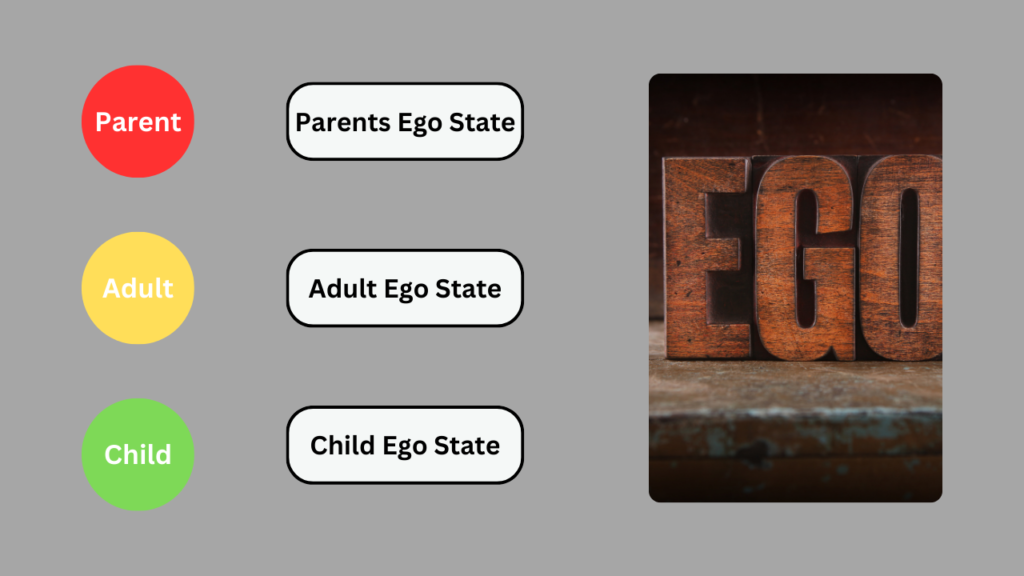
Parent Ego State: Internalized Authority Figures
In transactional analysis, the Parent ego state refers to the internalized voice of authoritative figures such as parents, caregivers, or other significant adults from infancy. This ego state is shaped by experiences, ideas, and values learned from authoritative figures, which influence how people see and interact with their surroundings.
- Nurturing Parent: The Nurturing Parent feature of the Parent ego state represents caring, supportive, and protective conduct. Individuals functioning from this site may provide direction, encouragement, and comfort to themselves and others, based on favorable experiences with nurturing figures.
- Critical Parent: The Critical Parent feature of the Parent ego state is characterized by judgmental, controlling, or authoritarian attitudes. Individuals working from this perspective may take a critical or punitive approach to themselves and others, reflecting internalized criticism or expectations from authority figures.
Adult Ego State: Rational and Objective Thinking
In transactional analysis, the Adult ego state depicts reasonable, objective, and logical thinking that is not influenced by previous experiences or emotions. This ego state allows people to examine information, solve issues, and make informed decisions based on facts and evidence.
The Adult ego state promotes rational reasoning and problem-solving, enabling individuals to approach circumstances objectively. This feature of the ego state promotes critical thinking, analysis, and sound decision-making in a variety of situations.
Child Ego State: Emotional and Impulsive Responses
The Child ego state in transactional analysis refers to emotional, spontaneous, and intuitive responses impacted by childhood experiences and sentiments. This ego state includes both positive and negative feelings, as well as lighthearted and carefree actions.
- Free Child: The Free Child element of the Child ego state represents spontaneity, inventiveness, and free expression of emotions. Individuals functioning from this component may engage in lively, joyous, or rebellious conduct, embracing their innate curiosity and passion.
- Adapted Child: The Adapted Child feature of the Child’s ego state represents learned reactions and adjustments to parental or cultural expectations. Individuals functioning from this component may follow rules, standards, or roles set by authoritative persons, repressing their true emotions or wanting to obtain acceptance or escape punishment.
What are Eric Berne’s Transactional Analysis Techniques?
Ego State Analysis in Interpersonal Communication
Ego state analysis is a core technique in transactional analysis that entails identifying and comprehending the ego states that exist within oneself and others during interpersonal conversation. Individuals can acquire insight into their behaviors, communication patterns, and relationship dynamics by identifying the prevailing ego states involved in transactions.
- Self-Analysis: Individuals can utilize ego state analysis to reflect on their thoughts, feelings, and behaviors in a variety of contexts. Individuals can analyze the efficiency of their communication by determining whatever ego state they are in and making conscious choices to transition to more adaptive ego states.
- Interpersonal Communication: Ego state analysis can also assist people in understanding the ego states of others and interpreting their verbal and nonverbal clues more effectively. Recognizing the ego states involved in transactions allows people to change their communication style, personalize their responses, and encourage more meaningful and effective interactions.
Practical Applications for Personal Development
Transactional analysis provides practical applications for personal development and self-improvement in a variety of domains, including relationships, communication, and emotional health.
- Conflict Resolution: Transactional analysis techniques can help discover and resolve underlying disputes, misunderstandings, and power struggles in relationships. Individuals can resolve disagreements constructively and develop their relationships with others by encouraging open communication, empathy, and a knowledge of ego states.
- Emotional Regulation: Transactional analysis helps people become more aware of their emotions, triggers, and coping techniques. Individuals who understand the impact of ego states on emotional reactions can build more effective stress, anxiety, and interpersonal problem management solutions.
- Personal Growth: Transactional analysis emphasizes self-reflection, introspection, and ongoing learning as essential components of personal development. Individuals can create resilience, self-confidence, and fulfillment in their lives by evaluating life scripts, challenging limiting beliefs, and practicing assertive communication.
Consider a couple, David and Sarah, who constantly disagree about home obligations. During a heated conversation, David takes a critical tone, reminding Sarah of her perceived failures to do responsibilities (the Critical Parent ego state). Sarah becomes protective and retreats into quiet, hiding her feelings to avoid conflict (Adapted Child ego state). David and Sarah can understand their responsibilities in the transaction by analyzing their ego states and exploring healthier communication tactics. By assuming the Adult ego state and participating in honest, sympathetic discourse, they can address underlying issues, voice their needs and concerns, and find mutually beneficial solutions to their disagreements.
Eric Berne’s Influence on Interpersonal Relationships

Applying Transactional Analysis in Relationships
Enhancing Communication and Understanding
Transactional analysis (TA) provides effective techniques for improving communication and understanding in relationships. Individuals who recognize and analyze ego states can increase their capacity to communicate themselves effectively and sympathize with others.
- Ego State Awareness: Individuals in partnerships can benefit from becoming more conscious of both their own and their partners’ ego states. Individuals who recognize whether they are in the Parent, Adult, or Child ego states can communicate more clearly and truthfully, avoiding misunderstandings and confrontations.
- Empathetic Listening: Transactional analysis emphasizes the significance of sympathetic listening, in which people actively listen to comprehend their partner’s perspective and emotions. Empathetic listening allows individuals to affirm their partner’s feelings, create trust, and strengthen emotional attachments in partnerships.
Resolving Conflict Using Transactional Analysis Techniques
Transactional analysis offers useful approaches for dispute resolution and improving relationship dynamics.
- Transactional Analysis Games: During confrontations, people may play transactional analysis games like “Why Don’t You—Yes, But” or “See What You Made Me Do!” Individuals who recognize these games and their underlying habits can break damaging communication cycles and approach disagreements more constructively.
- Clear Communication: Transactional analysis encourages people to express their demands, boundaries, and emotions assertively and politely. Individuals who express themselves openly and honestly can build mutual understanding, negotiate compromises, and create mutually acceptable conflict resolution solutions.
Related Reading: Bowlby’s Attachment Theory: Promoting Healthy Attachment
Transactional Analysis Strategies for Personal Growth
Recognizing Life Positions and Patterns
Transactional analysis enables people to detect and challenge problematic life circumstances and patterns that have an impact on their relationships and well-being.
- Self-Reflection: Self-reflection and introspection allow individuals to identify their main life positions and how they influence their ideas, feelings, and behaviors. Recognizing negative patterns allows individuals to take steps toward more positive and empowering life stances, such as “I’m OK, You’re OK.”
- Script Analysis: Transactional analysis helps people to analyze their life scripts, which are unconscious patterns of behavior and beliefs created during childhood. Individuals who recognize how these scripts influence their relationships and life choices can rewrite their scripts and make intentional decisions to live more fulfilled and honest lives.
Implementing Transactional Analysis in Daily Interactions
Transactional analysis can be used in everyday encounters to foster personal development and improve relationships.
- Mindful Communication: Individuals can speak deliberately and truthfully with others by using transactional analysis principles like ego state awareness and empathic listening. Mindful communication promotes deeper connections, mutual respect, and emotional closeness in partnerships.
- Conflict Resolution Skills: Transactional analysis teaches people how to resolve conflicts by spotting transactional patterns, communicating assertively, and negotiating effectively. Individuals who practice these skills in everyday encounters are better able to negotiate disagreements, maintain appropriate boundaries, and create harmonious relationships.
For example, consider Alex and Emily, a couple who frequently disagree on domestic chores. Alex and Emily can improve their communication and conflict-resolution skills by applying transactional analysis approaches. Recognizing their ego states during fights (for example, Alex operating from a Critical Parent ego state and Emily reacting from an Adapted Child ego state) allows them to break negative patterns and transition to more constructive communication methods. Empathetic listening and assertive communication enable them to express their requirements, affirm each other’s viewpoints, and collaborate to discover solutions that meet both of their needs. By incorporating transactional analysis principles into their daily interactions, Alex and Emily may gradually build their relationship, deepen their connection, and cultivate a supportive and harmonious partnership.
Related Reading: Cognitive Triad: Enable Growth with Essential Insights
Eric Berne’s Quotes
- “We are born princes and the civilizing process makes us frogs.”
- “The moment a little boy is concerned with which is a jay and which is a sparrow, he can no longer see the birds or hear them sing.”
- “Games are a compromise between intimacy and keeping intimacy away.”
- “Life is a game and true love is a trophy.”
- “If you do not breathe through writing, if you do not cry out in writing, or sing in writing, then don’t write, because our culture has no use for it.”
- “The human is a storytelling animal.”
- “We are all born princes and the civilizing process makes us frogs.”
- “A loser doesn’t know what he’ll do if he loses, but talks about what he’ll do if he wins, and a winner doesn’t talk about what he’ll do if he wins, but knows what he’ll do if he loses.”
- “Man is not truly one, but truly two.”
- “The inarticulate world of the unconscious is of infinite size.”
Eric Berne’s Impact on Psychology
Revolutionizing Communication Dynamics
Transactional Analysis Techniques for Effective Communication
Eric Berne’s transactional analysis theory transformed communication dynamics by providing practical strategies for improving interpersonal relationships.
- Ego State Analysis: Transactional analysis provides the concept of ego states, which represent various ways of thinking, feeling, and behaving. Individuals can gain a better understanding of their own and others’ motivations by examining ego states during conversation, resulting in more effective and compassionate communication.
- Transactional Patterns: Berne recognized transactional patterns, or “games,” that people engage in throughout exchanges. Individuals who recognize these behaviors can break the cycle of unproductive communication and engage in more authentic and meaningful discourse.
Influence of Eric Berne’s Communication Models
Eric Berne’s communication models had a significant impact on psychology and interpersonal communication.
- Strokes Model: Berne created the concept of strokes, which are units of recognition and affirmation conveyed between people. This model emphasizes the significance of positive reinforcement and empathic listening in developing good relationships and communication.
- Transactional Analysis Games: Berne’s concept of transactional analysis games illuminates frequent communication mistakes and provides insights into how people might break out from damaging patterns and engage in more authentic and rewarding connections.
Legacy and Continued Relevance
Evolution of Transactional Analysis in Modern Psychology
Eric Berne’s legacy continues to shape modern psychology, with transactional analysis evolving and growing across disciplines.
- Clinical Psychology: Transactional analysis approaches are frequently utilized in clinical psychology to provide psychotherapy, counseling, and mental health treatment. Therapists use transactional analysis ideas to assist clients in improving their communication skills, managing conflicts, and overcoming psychological obstacles.
- Organizational Psychology: Transactional analysis is used in organizational psychology to improve leadership effectiveness, team dynamics, and workplace communication. Transactional analysis techniques assist firms in cultivating a positive work culture, increasing employee happiness, and optimizing productivity.
Contemporary Applications and Research Studies
In contemporary psychology, transactional analysis is still being researched and explored, with continuous studies looking at its efficacy and applicability.
- Evidence-Based Practice: Transactional analysis techniques are still being studied for their usefulness in a variety of situations, including therapy, education, and organizational development. Evidence-based practice directs the incorporation of transactional analysis into clinical interventions and professional development programs.
- Interdisciplinary Collaboration: Transactional analysis connects many disciplines, encouraging interdisciplinary collaboration and innovation in psychology. Researchers from several domains work together to investigate the intersections of transactional analysis, neuroscience, sociology, and communication studies, thereby expanding our understanding of human behavior and relationships.
Conclusion
Eric Berne’s contributions to psychology, particularly his transactional analysis, have transformed our knowledge of communication dynamics, interpersonal relationships, and human growth. Berne’s creative theories and practical tactics continue to inspire scholars, therapists, educators, and professionals around the world.
Looking ahead, the study of transactional analysis shows promise for further advances in psychology and human behavior. Continued study, multidisciplinary collaboration, and practical applications will help transactional analysis theory evolve and remain relevant in addressing current concerns and fostering well-being.
Finally, Eric Berne’s legacy encourages us to incorporate transactional analysis ideas into our daily encounters, developing empathy, understanding, and real communication. By embracing transactional analysis concepts and strategies, we may foster healthier relationships, resolve issues constructively, and improve our personal and professional lives.

